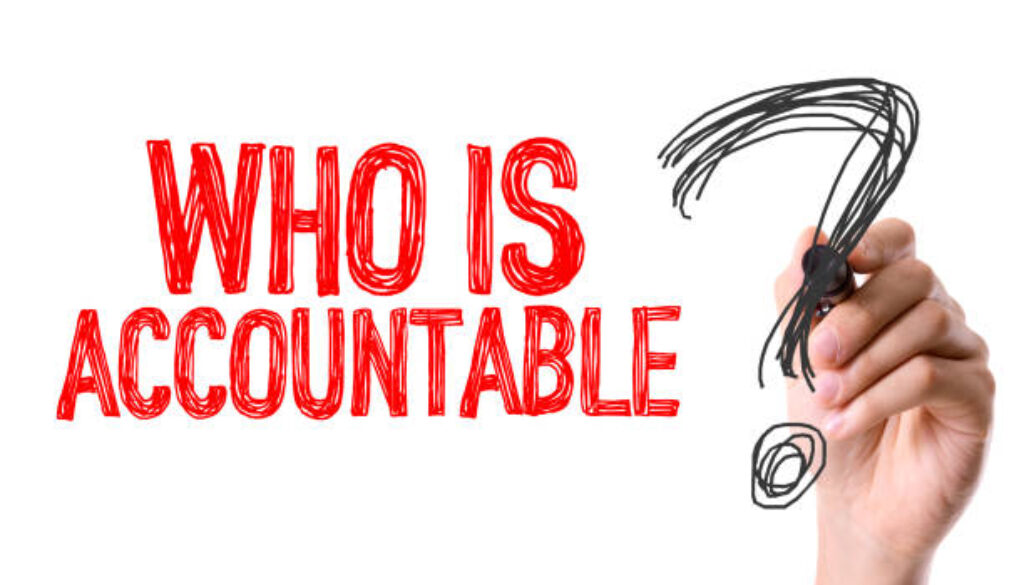Taking Personal Responsibility
Menanteau Serfontein – 13 May 2021
 “Parents can only give good advice or put them on the right paths, but the final forming of a person’s character lies in their own hands.”
“Parents can only give good advice or put them on the right paths, but the final forming of a person’s character lies in their own hands.”
― Anne Frank
 “There is an expiry date on blaming your parents for steering you in the wrong direction; the moment you are old enough to take the wheel, responsibility lies with you.”
“There is an expiry date on blaming your parents for steering you in the wrong direction; the moment you are old enough to take the wheel, responsibility lies with you.”
― J.K. Rowling
 “If you could kick the person in the pants responsible for most of your trouble, you wouldn’t sit for a month.”
“If you could kick the person in the pants responsible for most of your trouble, you wouldn’t sit for a month.”
― Theodore Roosevelt
“Everything you do is based on the choices you make. It’s not your parents, your past relationships, your job, the economy, the weather, an argument or your age that is to blame. You and only you are responsible for every decision and choice you make. Period.” ― Wayne Dyer
- How do you tend to deal with challenges, problems and issues that come across your path?
- Do you tend to take personal responsibility, or do you ignore it, hoping that it would just go away?
- Do you tend to find excuses and blaming others, your circumstances, or outside forces for what happens in your life?
There is no doubt that all of us have a large degree of control over the vast majority of things that we have to deal with in life, e.g. how we think, our decisions, behaviour, actions, what we say and how we say it, most of our circumstances, the consequences of our decisions and actions and how we react to problems and issues that arise.
Experience and empirical evidence prove that what we regard as matters being within and outside our control and how we deal with issues on a daily basis, has a profound impact on our lives.
I am grateful for growing up in a family where my parents, when things went wrong, would insist that I should first ask myself “what did I do that caused the problem or to what extent might I have contributed to what happened”? Assessing the cause(s) of the consequences in this way, can be difficult and even painful, but it forces you to identify which part(s) of the cause(s) are your personal responsibility.
Don’t run away from your problems, pretending or convincing yourself that they don’t exist. Be honest with yourself and others. Don’t delay in dealing with issues; don’t procrastinate. Have the courage and resolve to dig deep and tackle the problem head-on. In doing so, be the first to apologize for the part that you have played in causing the problem. Thereafter, as quickly as possible, start focusing on fixing the problem, instead of wasting a lot of emotional energy and time on pointing fingers at others and casting blame which usually makes things even worse. Rather focus on solving the problem.
Over the years, I have often had to deal with situations where people keep complaining about what happened, feeling sorry for themselves and pointing fingers at everyone else who in their opinion was at fault. I always try to give the person I am dealing with sufficient time to express their views, feelings and emotions, because it is sometimes important to be a shoulder to cry on, …. up to a point.
At the appropriate time, you have to move to the next phase in the process, i.e. how to deal with the issue or even better, how to resolve it. It has often happened to me that when that point is reached, the individual concerned shows no interest in switching to problem-solving.
For most issues, there is a point where it serves no further purpose to dwell on the emotions, the hurt, the blaming of others and feeling sorry for yourself. At some stage, it becomes essential to realize that “it is what it is” and to move on to focus on dealing with the way forward, i.e. to focus on resolving the problem or to deal with the next steps in an endeavour to resolve the matter. Regrettably, some people prefer to remain stuck in a victim mentality (self-pity) coupled with complaining, without taking responsibility and seeking solutions for the way forward.
Sure, other people and factors do have an influence, but you are responsible for your own actions and anything that happens within the boundaries of your control.
There could be various reasons why some people are unwilling or unable to assume responsibility when necessary. One of the key reasons could be the person’s “Locus of Control”.
In an Article entitled “Locus of Control and Your Life”, Kendra Cherry explains that if you believe that you have control over what happens, then you have what psychologists refer to as an Internal Locus of Control. If you believe that you have no or very little control over what happens and that external variables are always or usually to blame, then you have what is known as an External Locus of Control.
Your locus of control can influence not only how you respond to the events that happen in your life, but also your motivation to take action.
If you believe that you hold the keys to your fate, you are more likely to take action to change your situation when needed. If on the other hand, you believe that the outcome is out of your hands, you may be less likely to work toward change.
Internal vs. External Locus of Control
Cherry points out that it is important to note that locus of control is a continuum. No-one has a 100 percent external or internal locus of control. Instead, most people lie somewhere on the continuum between the two extremes.
Below are some of the characteristics of people with dominant Internal or External Locus of Control:
Dominant Internal Locus of Control:
- Are more likely to take responsibility for their actions
- Tend to be less influenced by the opinions of other people
- Often do better at tasks when they are allowed to work at their own pace
- Usually, have a strong sense of self-efficacy, i.e. people who strongly believe that they are capable and responsible for their own motivation, behaviour and circumstances, as well as the consequences of their actions.
- Tend to work hard to achieve the things they want
- Feel confident in the face of challenges
- Tend to be healthier
- Report being happier and more independent
- Often achieve greater success in the workplace
Dominant External Locus of Control:
- Blame outside forces for their circumstances
- Often credit luck or chance for any successes
- Don’t believe that they can change their situation through their own efforts
- Frequently feel hopeless or powerless in the face of difficult situations
- Are more prone to experiencing learned helplessness (a condition in which a person suffers from a sense of powerlessness, arising from a traumatic event or persistent failure to succeed.)
You may wish to conduct an honest self-assessment to determine the extent to which your Dominant Locus of Control is Internal or External. If you find that your Dominant Locus of Control is External, you should find practical ways and means to cultivate a stronger Internal Locus of Control that will enable you to take greater personal responsibility. This could be done, amongst other things, through cultivating a new Habit or perhaps seeking expert advice and assistance to help you.
Know that avoiding responsibility is as much a Habit as it is a conscious decision. It is a mindset and a pattern of behaviour that you create.
“The victim mindset dilutes the human potential. By not accepting personal responsibility for our circumstances, we greatly reduce our power to change them.” – Steve Maraboli
Stepping up and taking responsibility for what’s going on in your life is one of the most important things you will ever do. Essentially, this means acknowledging the role you play in your own life – the good bits and the bad bits. Rather than looking around for someone or something else to blame, you must accept that you are in charge of what is going on.
If you suffer from a tendency to avoid taking personal responsibility, then I strongly recommend that you develop a new Habit that will increase your willingness and ability to take personal responsibility. How to develop a new Habit is explained in detail in a previous Article on this Website entitled “Habits – What is it all about, How can Habits be Changed and New Ones Developed.”
“Our lives are a sum total of the choices we have made.” – Wayne Dyer
All of us should take responsibility for the things that are within our control and take appropriate action to deal with it. We must assume “agency” over our life. Agency is the sense of control that you feel in your life, your capacity to influence your own thoughts and behaviour, and have faith in your ability to handle a wide range of tasks and situations. Your sense of agency helps you to be psychologically stable, yet flexible in the face of conflict or change. Don’t relinquish your agency to anything or anybody else, except submission to God, in which event you are still responsible for your thoughts, words and actions.
 “In the long run, we shape our lives, and we shape ourselves. The process never ends until we die. And the choices we make are ultimately our own responsibility.”
“In the long run, we shape our lives, and we shape ourselves. The process never ends until we die. And the choices we make are ultimately our own responsibility.”
― Eleanor Roosevelt
Some of the content of this Article was derived from the following sources:
- Article entitled “Locus of Control and Your Life” by Kendra Cherry, contained in https://www.verywellmind.com/what-is-locus-of-control-2795434
- Article entitled “How to Take Responsibility for Your Actions & Life” contained in A Conscience Rethinkhttps://www.aconsciousrethink.com/8562/take-responsibility/






